Danish Parliament Passes Restrictive Migrant Laws
Post# of 65629

< >

The Danish Parliament has passed new restrictive migrant laws that will introduce a ceiling on chain migration and allow an uninhabited island to become a deportation centre.
The new changes have long been advocated by the populist Danish People’s Party (DF) who welcomed the new law calling it a paradigm shift on migration Sveriges Radio reports.
The new agreement issues a number of changes to Danish migration policy including lowering the country’s integration allowance, introducing a limit on chain migration and only in cases where family reunification is a necessity, as well as making residence permits temporary and easier to cancel.
The most controversial aspect of the new legislation has been the proposal to make the uninhabited island of Lindholm a centre for criminal migrants set to be deported back to their countries of origin. The island had formerly been used as a research station for agricultural diseases.
Finance Minister Kristian Jensen explained the use of the island for housing deportees saying, “There are more limits to how much you can move around when you are on a deserted island. You are in principle obliged to remain on the island. So we will have more control over where they are.”
The laws continue the migrant policy of Denmark which has been much tougher on border security and mass migration than its neighbour Sweden since the height of the migrant crisis in 2015.
Earlier this week the DF requested that the temporary border controls between the two countries be made permanent arguing that the controls will prevent Swedish criminals from crossing the border.
The country has also opened up the possibility for recognized refugees to return to their homelands when they are deemed safe, rather than seeing the asylum process as a path to permanent residency status.
In December, Migration Minister Inger Støjberg spoke to the Somali community about returning to their country saying, “If you no longer need our protection and your life and health are no longer at risk in your home country, and specifically in Somalia, you must, of course, return home and rebuild the country from which you came from.”
 (0)
(0) (0)
(0)